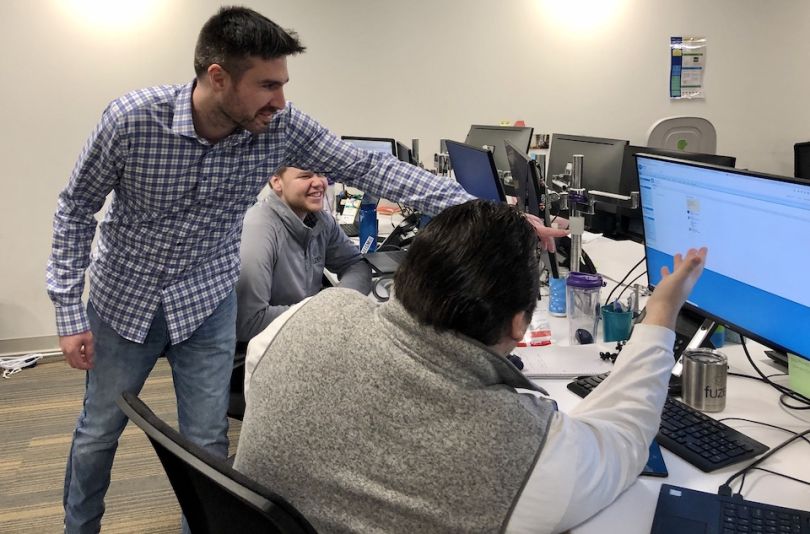In the sales world, a commission is a strong motivating factor — a hefty paycheck is a hanging carrot that allows many salespeople to deal with rejection after rejection before landing the big sale.
But how do sales managers motivate a team to keep crushing their quotas month after month? To start, Drift Sales Manager Mike Castillo said creating a culture of continued learning helps keep reps pushing for success.
“If people are placed in positions where knowledge acquisition is an absolute constant, they tend to become highly engaged and stimulated by their work,” Castillo said.
Sales leaders understand the importance of building the skills of their reps, and they take a variety of approaches to facilitate growth within their teams. For instance, managers work to understand what motivates employees and provide tailored coaching strategies to help reps meet personal and professional goals. As well, leaders create work environments that encourage team members to support one another and share knowledge.

CarGurus Senior Sales Manager Rachel Weed gives her salespeople agency in determining the direction of their weekly coaching sessions with her. She said team members dictate the coaching style they prefer, and use individual trainings to advance toward whatever goals they set for themselves.
What are some strategies you use to motivate your sales team?
Understanding the “why” of my team’s motivations. If a team member is motivated by money, I need to understand why that drives them and what that extra commission check will do for them. So I have every rep on my team create a personal, professional and financial goal using the S.M.A.R.T. methodology and we track their progress quarterly. While this can be a somewhat vulnerable activity for an individual, I share my goals with them to level the playing field. My goal is to make clear that I’m going to push them in every way possible to achieve what’s important to them both inside and outside work.
The S.M.A.R.T. methodology
What does professional development look like for your salespeople?
The biggest impact I can have as a manager is helping my reps improve the skill sets that enable them to do their work more efficiently — then to eventually outgrow their role. I don’t expect them to be on my team in their same capacity forever. In fact, I try and actively push them out of their comfort zone to be able to achieve more than they ever dreamed.
To foster commitment toward their own growth, I prioritize 30 to 45-minute weekly coaching sessions. These coaching sessions are 100 percent their time to build their own action items, so buy-in is obvious. I make it clear how important their development is to me. And by building this culture of trust and transparency around career development, I find that reps are much more open about their goals and motivations, which helps retain talent within the company.

Patrick McDonough said Fuze prioritizes giving salespeople visibility into what their day-to-day will look like before they start selling, and keeps a pulse on how well they’re performing once they start. The director of worldwide business development said new reps partake in extensive shadowing throughout the onboarding process, and a quarterly review keeps them on the path to success.
What are some strategies you use to motivate your sales team?
Our team has weekly commitments, like new business meetings, that we share in our team kickoff meeting. I give the team a mid-week update on everyone’s progress, and we finish the week with a recap where each team member walks us through their key takeaways. Communication between myself and the team is both open and consistent.
Another way to build loyalty and increase motivation is by taking an interest in employees and demonstrating their importance through little things like making sure to never miss a one-on-one. If they need something, it’s important to me that I set expectations, follow through and hold myself to the same standard to which I hold them.
Lastly, of course, are competitions. We run competitions and set goals based on the team’s commitments for the quarter. At the end of the quarter they’ll receive cash prizes and choose a special team outing. Recently, we’ve tried to create a strong team rapport by running a quarterly competition, teaming up reps in North America, Europe, the Middle East and Africa into groups. We’re encouraging collaboration between groups that normally wouldn’t work closely together.
We build reviews based on hard and soft skills that the hiring managers within our organization seek.”
What does professional development look like for your salespeople?
We built a readiness program that runs for four to six weeks and allows new reps to get some experience in the role, get exposure to the group they might hope to join and build relationships with that team. It gives them valuable insight into what’s required of that role and where they need to focus their self-development efforts. As a manager, you get a better sense of their readiness level and how you can help them accelerate their growth.
Fuze also takes a comprehensive approach to reviews. We build reviews based on hard and soft skills that the hiring managers within our organization seek. Leaders then meet quarterly with the reps to talk about where they are compared to those competencies. This quarterly process consists of a self-review and an independent manager review, which allows us to communicate openly, identify perception gaps and come together on a plan to move them forward.

As head of sales at Detectify, Wilder Parks said he promotes agency among his team members. The leader said he pushes employees to not only share their ideas with the team, but also to spearhead implementing them.
What are some strategies you use to motivate your sales team?
It’s important to challenge the team and give them opportunities to further their growth and leadership abilities. I try to sit down with reps and give them opportunities to share their ideas and understand how their proposals could be beneficial to them as individuals and to the team. Then I let them take the lead on implementing their ideas.
I also work to understand their ultimate goals for growth so we can work together to achieve them.
Being transparent with the team allows everyone to have a voice and share their ideas.”
What does professional development look like for your salespeople?
Our culture is built around collaboration, encouragement, open communication and continued learning. Embodying those values each day and being transparent with the team allows everyone to have a voice and share their ideas. Encouraging people to take on different initiatives allows them to buy in and own certain tasks. Ideas are constantly being shared among the team and we build off each other. Through all of this comes a lot of learning and development, particularly on sales strategies and furthering our technical knowledge.

Sales Manager Mike Castillo said a healthy work environment is key for the success of his team at Drift. Castillo added that continuous learning is a key part of creating that balanced atmosphere, as well as agency, collaboration and a healthy dose of fun.
What are some strategies you use to motivate your sales team?
I work to promote a learning-based environment and cultivate a welcoming and non-threatening workplace.
Facilitating learning means continuous coaching via call reviews, role plays and daily stand-ups, as well as teaching advanced sales methodologies and discussing plenty of books (sales-related or otherwise).
Creating a great work environment means not micromanaging, encouraging everyone to share their opinions, showing trust and respect and, finally, ensuring that we have time to laugh. Give salespeople the ability to learn, grow, find meaning and have fun while still being challenged daily in a compelling way, and they’ll be motivated to stick around.
Creating a great work environment means not micromanaging.”
What does professional development look like for your salespeople?
If people are placed in positions where knowledge acquisition is an absolute constant, they tend to become highly engaged and stimulated by their work.
One of the ways my team carries this idea out is by constantly helping one another improve. This custom is challenging to achieve given that it isn’t something that can happen from one day to the next. Making this a reality requires delicate dedication and genuine care for the development and day-to-day satisfaction of an entire team, applied brick by brick. Eventually, a company will have laid down enough individual bricks that they become a solid house, built upon a firm foundation of trust, respect and progress.

Gravyty VP of Sales Chris Campbell said his team is motivated by the idea of bettering themselves professionally. Campbell said feedback, mentoring and other strategies help salespeople advance their skills and ultimately extract more fulfillment from their roles.
What are some strategies you use to motivate your sales team?
As leaders, we aim to provide principles for excellence by creating an environment where each team member is motivated to improve, challenging them to contribute their best and rewarding them for their contributions. We collaborate to share learnings, modify best practices and iteratively improve, while still retaining an atmosphere of competition. Beyond monetary rewards, our team is best motivated by successfully moving along the path to mastery; the better you get, the more you enjoy what you are doing.
The better you get, the more you enjoy what you are doing.”
What does professional development look like for your salespeople?
Our team culture is based on active learning. Every contributor strives to continuously refine their skills and shares their individual learnings to contribute to group knowledge. Peer-to-peer evaluation and feedback, video and audio reviews, best-practice refinement and one-on-one mentoring are critical components of our program.

Jeffrey Landry said he wants to know what drives his reps as soon as they start. FareHarbor’s mid-market sales manager said getting an early idea of a salesperson’s motivations helps him better guide employees down paths that lead to professional and personal success.
What are some strategies you use to motivate your sales team?
I sit down with each team member when they start to find out their three main motivations. Once those are set, we come up with measurable goals for the quarter and three actions that they will take over the month, quarter and year that will help them reach those goals. It’s all about accessing and enabling the individual. When they come up with goals and plans, they have an added sense of accountability and pride toward what they created.
I sit down with each team member when they start to find out their three main motivations.”
What does professional development look like for your salespeople?
I bring up an employee’s three main motivators and goals in future-focused conversations in our one-on-one meetings. Then I weave in motivational aspects, career development and team goals.







